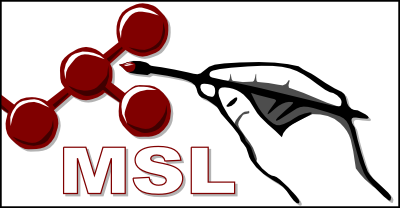Difference between revisions of "Main Page"
(→Reference) |
|||
| Line 47: | Line 47: | ||
'''MSL in the literature''' | '''MSL in the literature''' | ||
<pubmed>19722646</pubmed> | <pubmed>19722646</pubmed> | ||
| + | <pubmed>20080739</pubmed> | ||
Revision as of 22:41, 14 July 2010
MSL: an open source C++ library for analysis, manipulation, modeling and design of macromolecules.
Contents
Philosophy
The main goal is to create a set of tools that enable the computational study of macromolecules with relative ease at all levels, from simple operations (for example, load a PDB and measure a distance or edit a dihedral) to complex applications (protein modeling or design).
The MSL library is not a program (although some applications are distributed) but a tool for scientist to code their own methods.
Features
Some of the features supported by the library are:
- Support for reading and writing PDB files.
- The ability of storing and switching between multiple atom coordinates, for conformational changes and rotameric representation of side chain conformational freedom.
- For protein design, the ability to build and store multiple residue identities (i.e. LEU, ILE, ALA) at a position and switch between them.
- Transformations such as translations, rotations, and alignments.
- The CHARMM force field and other potential energies.
- Support for CHARMM topology and parameter files.
- Structure building from scratch (using internal coordinates)
- Search algorithms such as Monte Carlo, Dead End Elimination, and Self Consistent Mean Field Monte Carlo.
- Local backbone sampling.
- Crystal lattice generation.
- A PyMOL Python Interface for calling MSL code from within PyMOL.
- A R Interface for calling arbitrary R algorithms or plotting routines from within MSL
- And more...
Documentation
The Documentation – currently still under construction – provides a description of the objects and of some distrubuted programs and utilites. A step by step tutorial is being assembled.
Status
The libraries are in an advanced alpha stage and in active development. They are suitable for production work (at your own risk, we use them for it daily), but the APIs are not set in stone so the occasional bug will surface and feature development will be ongoing.
Source
The source code can be downloaded on SourceForge. Go to the Download page. ("To do" list).
Main development team:
- Senes Lab, U Wisconsin-Madison: Alessandro Senes (senes _AT_ wisc.edu), Sabareesh Subraminiam (subramaniam2 _AT_ wisc.edu)
- Biosciences Division, Los Alamos National Lab: Dan Kulp (dwkulp _AT_ lanl.gov)
- DeGrado Lab, U Pennsylvania: Brett Hannigan (brettth _AT_ mail.med.upenn.edu), Jason Donald (jdon _AT_ mail.med.upenn.edu)
Reference
A primary manuscript is currently in preparation.
MSL in the literature
Yao Zhang, Daniel W Kulp, James D Lear, William F DeGrado
Experimental and computational evaluation of forces directing the association of transmembrane helices.
J Am Chem Soc: 2009, 131(32);11341-3
[PubMed:19722646]
##WORLDCAT## [DOI]
(I p)
